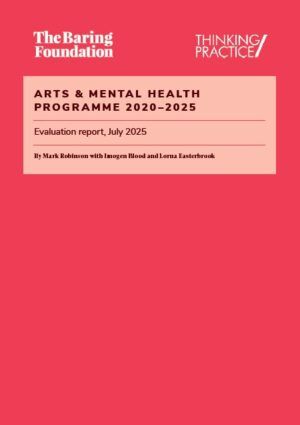A rich portrait of a field
We are delighted to see this evaluation of the Baring Foundation’s Arts programme published. Having enjoyed working with David Cutler and the Foundation previously, Thinking Practice relished the opportunity to conduct the evaluation, working with long-time colleagues Imogen Blood and Lorna Easterbrook.
Over multiple projects we have developed an approach which blends our individual backgrounds and fields – arts, creative aging, social work, health, housing and much else – with methodologies combining quantitive data and structured collective consideration of human experiences.
We proposed an inclusive process including surveys and interviews alongside stories of change, sharing perspectives on the field and those stories, and involving people active in the field – with ‘skin in the game’ – to inform our own final analysis. This kind of openness is challenging for some funders. It was heartening that the Foundation welcomed this approach. As we found, it sits well with their style as a funder.
20 stories were co-created with individuals from a cross-section of organisations funded by the programme in the last five years. I would encourage everyone to read the appendix of stories from the Most Significant Change process as well as our main report. They are insightful and inspiring in themselves: a rich portrait of the diversity, imagination and dedication of a field working with people in their most vulnerable moments.
Positive impact
Five years on, the field has grown, though challenges continue. Originally Baring estimated there were around 100 organisations specialising in this field. It has now supported over 170, with demand far outstripping available funding.
The Foundation has made a major impact on a rapidly developing area of practice, but the field (as a whole) remains fragile and precarious. The most commonly chosen description of the impact in our online survey sums up a message we heard throughout: “It has begun to make a difference but there’s a lot more to do.”
This Programme has stimulated important contributions to building national networks, which have in turn developed and encouraged adoption of frameworks and standards influencing practice on the frontline. Professionalisation, developing networks, training and development initiatives have spread skills and approaches across a highly dispersed workforce.
A number of projects have identified and shared ways of supporting practitioners, encouraging good mental health for all involved. This has included adapting partnerships and projects to ensure support and supervision for artists working in mental health settings. Some funding rounds have tackled specific areas of under-representation in Global Majority communities and amongst men.
A flexible funder
People’s experiences of working with the Baring Foundation team are generally very positive. It is a relational approach informed by curiosity as well as a position on what is needed, as seen in the thematically-focussed open calls and the publications. As one story sharer commented: “At their core they’re incredibly inquisitive.”
The Foundation were commonly described as agile, flexible, personable – even maverick – but with helpful gravitas. People welcomed how they made space for exploration of ideas but in a rigorous setting. One person summed up a common feeling: “Baring Foundation’s commitment to this field has been a beacon of rationality and proportion.”
This is mirrored in our own experience of working with them on this evaluation, and we thank David Cutler, Harriet Lowe, Jannat Hossain, and the Arts Committee for their enthusiastic engagement with this work. Not least they provided a sufficient budget for us to recompense freelancers and small organisations for their involvement: an example to other funders.
The future
We see potential for the Foundation to be even more influential in the future and urge it to maintain its focus as the field matures. Needs around creativity and mental health are great and growing, especially amongst young people. Although policy makers increasingly ‘get’ the case, this is yet to translate consistently into policies, funding and commissions that might enable more widely the sustainable growth some have achieved.
There is now a strong sense of what sustainable practices in a sustainable field should look like, yet a small foundation such as Baring cannot make those viable everywhere alone. Unrestricted funding was shown to be highly powerful, but the amount available is small in relation to the demand.
We suggest the key thing is to maintain diversity and innovative approaches whilst sustaining exemplar organisations and networks best-placed to develop cross-sector partnerships and the evidence base. Longevity in this field is unlikely to emerge solely from innovation: it will need key players such as the Foundation and others including national funding bodies and health partners to work on shared agendas, while allowing space for difference.
The Baring Foundation is a trusted broker capable of navigating diverse and sometimes competing interests across the field. We look forward to seeing how their responsive, possibility-focused flexibility contributes in the future.
Arts and mental health: committed until at least 2029
A response from Nick Capaldi, Chair of our Arts Committee
As Chair of the Baring Foundation’s Arts Committee I warmly welcome the independent evaluation of our Arts Programme from Thinking Practice. As their report notes, the Foundation is an inquisitive and committed supporter of projects that reflect creative approaches to ageing, mental health and social work. However, it’s always important that we look carefully at the impact of our funding, and explore effective ways of improving how we reach and discover those organisations who are doing imaginative and important work.
As always, we receive many excellent proposals and can’t always support the many good ideas that we hear about. Nevertheless, the Baring Foundation has always been prepared to take the long view, and I’m delighted that the Foundation has committed to funding the Arts Programme until at least 2029. You can find out more about our support and our funding programmes by exploring our website or signing up for our Arts e-newsletter.
